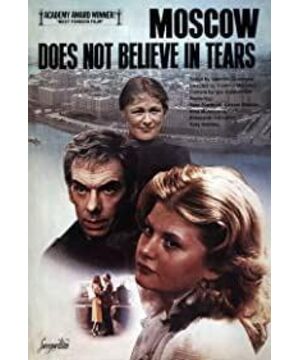"The Chinese Partner" actually talks about an American dream: about ideals, about hard work, about friendship, and about love, all intertwined together to form a standard American dream. However, this American dream was not made in the United States. The protagonist played by Deng Chao wanted to go to the United States to realize his American dream, but he encountered setbacks. When serving in the restaurant, an old American woman told him to be strong, because his future is not like the owner of the restaurant, it will not be here. This typical God-like guidance made him regain his confidence. Back in China, he and his university friends realized their dreams. It wasn't until the end that the teachers in the "USA Today" class in college mentioned that they were "too naive."
"Moscow Doesn't Believe in Tears" is about a Soviet dream: about struggle and about ideals. To say a few more words, this Soviet film was shot in the 1980s in the Soviet Union. It can be seen that even in the Soviet Union, the openness of Europeans can still be seen. This film describes the lives and careers of several young women. Although it is a story 30 years ago, it feels like it happened in China today-girlfriends are studying how to use deceptive methods to confront celebrities, scientists, and civil servants. However, at a reception, an old director said to a young female worker: "When you were forty, your life had just begun." When the movie's scene was switched to 20 years later, the female worker who insisted on going to college became a university student. The director of the company, her life began at the age of forty. She not only reaped her career, but also reaped love.
"Li Chun" talks about a Chinese dream: about hardship. The heroine Wang Cailing, played by Jiang Wenli, lives in a city in northwest China. The painter she fell in love with has to leave there at all costs. Wang Cailing is a music teacher, talent and diligence have created her goddess-like singing ability. But she had nowhere to display her talents, and she was turned away by various colleges and groups after going to Beijing several times. Coincidentally, there is a person who loves ballet in that city. He has reached a level of obsession with him, but he is even more unacceptable. People secretly said that he was a "two Yizi", so that he tried to use rape to prove that he was a man. Different from the above two movies, these two protagonists can only indulge in dreams, and dreams have not become reality.
Whether it is the American Dream, the Soviet Dream, or the Chinese Dream, it is all about whether people with ideals can realize their ideals. Movies are only an artistic display of one aspect of society. No matter which country it is in, there are not only God’s darlings, but also people who are not met. The key is to see how society enables more ideal people to realize their ideals.
It is often said that there should be equal opportunities in society. But the reality is that so many people do not lose their offspring at the starting line at all costs. So, when you set a starting line, the opportunities are already unequal. Equality of opportunity is not impeccable either. When everyone has equal opportunities, people will work hard according to their talents and diligence. But the American dream of "success and harvest through hard work" is indeed too naive. This is impossible. Everyone's opportunities, talents, even the time, location, and combination of people affect personal development. Even if opportunities are equal, if a person chooses the wrong one, can he start again?
Therefore, how to enable everyone to realize their ideals will not make life miserable because of their wrong choices, will not do nothing because of their own talents, and will not miss happiness forever because they have not grasped the opportunity. Only in this way can everyone's dream come true. Even if you lose at the starting line, even if you lose at the fairest competition, you can still say to yourself: "At the age of forty, life has just begun."
View more about Moscow Does Not Believe in Tears reviews








